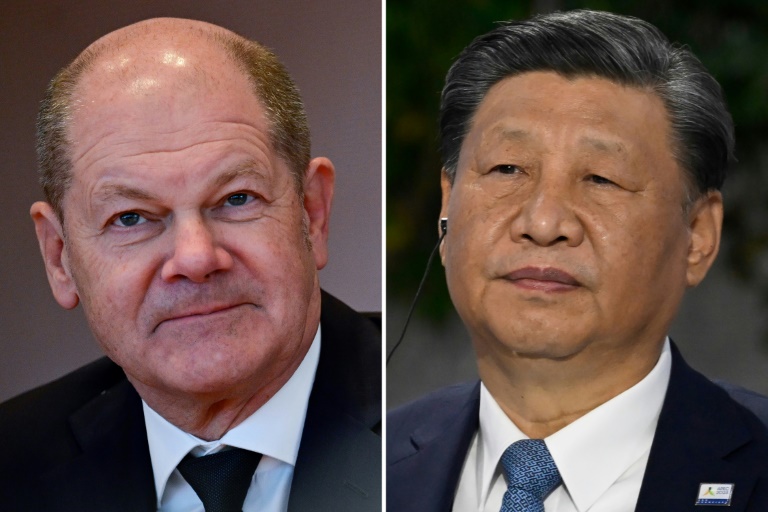Germany’s Scholz seeks Chinese role in ‘just peace’ for Ukraine

German Chancellor Olaf Scholz (L) and China’s President Xi Jinping (R) met in Beijing on Tuesday
Beijing – German Chancellor Olaf Scholz said Tuesday he hoped Berlin and Beijing could help achieve a “just peace” in Ukraine, as he met President Xi Jinping in the Chinese capital.
The chancellor arrived in China on Sunday, accompanied by a large delegation of ministers and business executives on his second visit to the country since taking office.
His whistlestop tour has taken him to the southwestern megacity of Chongqing, economic powerhouse Shanghai and now Beijing, but he faces a tough balancing act as he aims to shore up economic ties with Berlin’s biggest trading partner.
Meeting with Xi at Beijing’s Diaoyutai State guesthouse on Tuesday, Scholz told the Chinese leader he hoped to discuss “how we can contribute more to a just peace in Ukraine”.
While China says it is a neutral party in the Ukraine conflict, it has been criticised for refusing to condemn Moscow for its offensive.
And China and Russia have in recent years ramped up economic cooperation and diplomatic contacts, their strategic partnership only growing closer since the invasion of Ukraine.
Scholz on Tuesday told Xi that “the Russian war of aggression in Ukraine and Russia’s armament have a very significant negative impact on security in Europe”, according to a recording provided by the chancellor’s office.
“They directly affect our core interests,” he told Xi, adding they “damage the entire international order because they violate a principle of the United Nations Charter.”
He also touched on areas where he said the two countries could cooperate, including climate change.
“Only by working together will we be able to find solutions to stop climate change and manage the green energy transition in a socially just way,” Scholz said.
Chinese state media reported the pair would hold an informal discussion over tea in the capital.
Scholz is also expected to meet with Premier Li Qiang on Tuesday, sit down with a German-Chinese economic committee, and hold a press conference.
Scholz’s visit comes as many of Germany’s Western allies confront China on a range of trade issues.
A slew of probes into state aid for Chinese solar panels, electric cars and wind turbines are ongoing in Brussels.
The United States, meanwhile, is investigating national security risks posed by Chinese technology in cars.
